Ode to the West Wind
"Ode to the West Wind" is an ode, written by Percy Bysshe Shelley in 1819 near Florence, Italy. It was originally published in 1820 by Charles and Edmund Ollier in London as part of the collection Prometheus Unbound, A Lyrical Drama in Four Acts, With Other Poems. Some have interpreted the poem as the speaker lamenting his inability to directly help those in England owing to his being in Italy. At the same time, the poem expresses the hope that its words will inspire and influence those who read or hear it. Perhaps more than anything else, Shelley wanted his message of reform and revolution spread, and the wind becomes the trope for spreading the word of change through the poet-prophet figure. Some also believe that the poem was written in response to the loss of his son, William (born to Mary Shelley) in 1819. The ensuing pain influenced Shelley. The poem allegorises the role of the poet as the voice of change and revolution. At the time of composing this poem, Shelley without doubt had the Peterloo Massacre of August 1819 in mind. His other poems written at the same time—The Masque of Anarchy, Prometheus Unbound, and "England in 1819"—take up these same themes of political change, revolution, and role of the poet.
Percy Bysshe Shelley
Percy Bysshe Shelley was one of the major English Romantic poets, and is regarded by some as among the finest lyric poets in the English language, and one of the most influential. A radical in his poetry as well as in his political and social views, Shelley did not see fame during his lifetime, but recognition for his poetry grew steadily following his death. Shelley was a key member of a close circle of visionary poets and writers that included Lord Byron, Leigh Hunt, Thomas Love Peacock, and his own second wife, Mary Shelley, the author of Frankenstein.
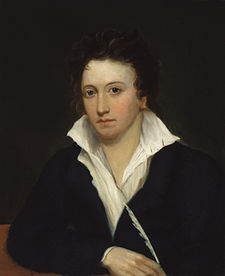
Richard Cory
"Richard Cory" is a narrative poem written by Edwin Arlington Robinson. It was first published in 1897, as part of The Children of the Night, having been completed in July of that year; and it remains one of Robinson's most popular and anthologized poems. The poem describes a person who is wealthy, well educated, mannerly, and admired by the people in his town. Despite all this, he fatally shoots himself in the head.
Edwin Arlington Robinson
Edwin Arlington Robinson (December 22, 1869 – April 6, 1935) was an American poet who won three Pulitzer Prizes for his work. He was nominated for the Nobel Prize in Literature four times.
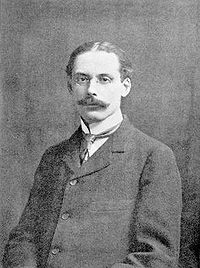
King Arthur
King Arthur is a legendary British leader who, according to medieval histories and romances, led the defence of Britain against Saxon invaders in the late 5th and early 6th centuries AD. The details of Arthur's story are mainly composed of folklore and literary invention, and his historical existence is debated and disputed by modern historians. The sparse historical background of Arthur is gleaned from various sources, including the Annales Cambriae, the Historia Brittonum, and the writings of Gildas. Arthur's name also occurs in early poetic sources such as Y Gododdin.

Round Table
The Round Table is King Arthur's famed table in the Arthurian legend, around which he and his Knights congregate. As its name suggests, it has no head, implying that everyone who sits there has equal status. The table was first described in 1155 by Wace, who relied on previous depictions of Arthur's fabulous retinue. The symbolism of the Round Table developed over time; by the close of the 12th century it had come to represent the chivalric order associated with Arthur's court, the Knights of the Round Table.

Ballad
A ballad /ˈbæləd/ is a form of verse, often a narrative set to music. Ballads derive from the medieval French chanson balladée or ballade, which were originally "danced songs''. Ballads were particularly characteristic of the popular poetry and song of the British Isles from the later medieval period until the 19th century. They were widely used across Europe, and later in the Americas, Australia and North Africa. Ballads are 13 lines with an ABABBCBC form, consisting of couplets (two lines) of rhymed verse, each of 14 syllables.
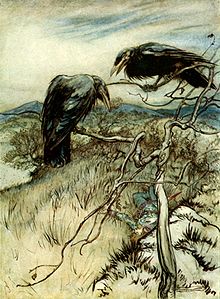
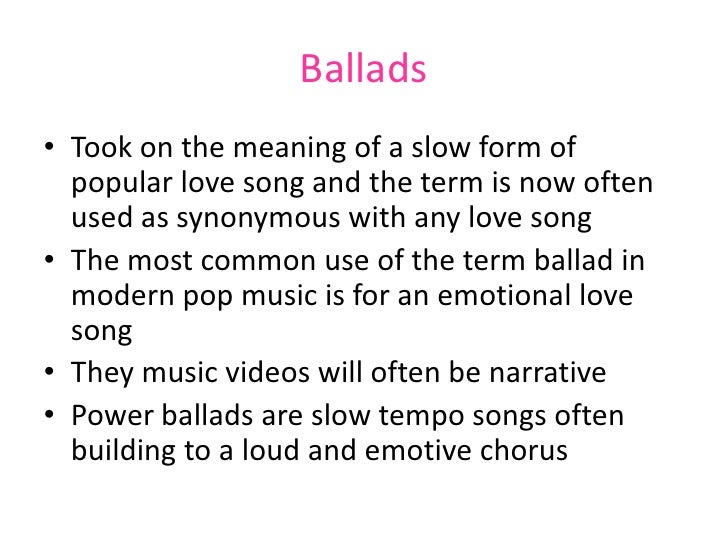
La Belle Dame sans Merci
"La Belle Dame sans Merci" (French for "The Beautiful Lady Without Mercy") is a ballad written by the English poet John Keats. It exists in two versions, with minor differences between them. The original was written by Keats in 1819. He used the title of the 15th-century La Belle Dame sans Mercy by Alain Chartier, though the plots of the two poems are different.
The poem is considered an English classic, stereotypical of other of Keats' works. It avoids simplicity of interpretation despite simplicity of structure. At only a short twelve stanzas, of only four lines each, with a simple ABCB rhyme scheme, the poem is nonetheless full of enigmas, and has been the subject of numerous interpretations.


John Keats
John Keats (/ˈkiːts/; 31 October 1795 – 23 February 1821) was an English Romantic poet. He was one of the main figures of the second generation of Romantic poets, along with Lord Byron and Percy Bysshe Shelley, despite his works having been in publication for only four years before his death.
Although his poems were not generally well received by critics during his lifetime, his reputation grew after his death, and by the end of the 19th century, he had become one of the most beloved of all English poets. He had a significant influence on a diverse range of poets and writers. Jorge Luis Borges stated that his first encounter with Keats's work was the most significant literary experience of his life.

Manna
Manna (Hebrew: מָן) or al-Mann (Arabic: المَنّ , Kurdish: gezo, Persian: گزانگبین), sometimes or archaically spelled mana, is an edible substance which, according to the Bible and the Quran, God provided for the Israelites during their travels in the desert during the forty-year period following the Exodus and prior to the conquest of Canaan.



The Tyger
"The Tyger" is a poem by the English poet William Blake published in 1794 as part of the Songs of Experience collection. Literary critic Alfred Kazin calls it "the most famous of his poems", and The Cambridge Companion to William Blake says it is "the most anthologized poem in English". It is one of Blake's most reinterpreted and arranged works.
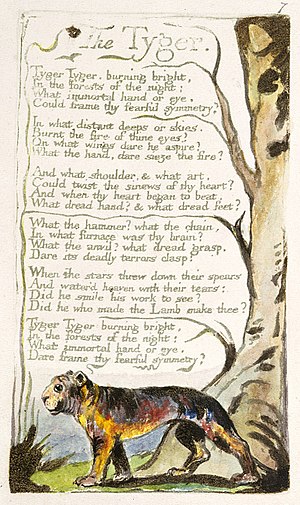
William Blake
William Blake (28 November 1757 – 12 August 1827) was an English poet, painter, and printmaker. Largely unrecognised during his lifetime, Blake is now considered a seminal figure in the history of the poetry and visual arts of the Romantic Age. His so-called prophetic works were said by 20th century critic Northrop Frye to form "what is in proportion to its merits the least read body of poetry in the English language". His visual artistry led 21st-century critic Jonathan Jones to proclaim him "far and away the greatest artist Britain has ever produced". In 2002, Blake was placed at number 38 in the BBC's poll of the 100 Greatest Britons.Although he lived in London his entire life (except for three years spent in Felpham), he produced a diverse and symbolically rich œuvre, which embraced the imagination as "the body of God" or "human existence itself".
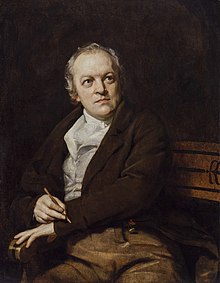
The Lamb
"The Lamb" is a poem by William Blake, published in Songs of Innocence in 1776.
The Lamb
Little lamb, who made thee
Dost thou know who made thee,
Gave thee life, and bid thee feed
By the stream and o’er the mead;
Gave thee clothing of delight,
Softest clothing, woolly, bright;
Gave thee such a tender voice,
Making all the vales rejoice?
Little lamb, who made thee?
Dost thou know who made thee?
Little lamb, I’ll tell thee;
Little lamb, I’ll tell thee:
He is callèd by thy name,
For He calls Himself a Lamb.
He is meek, and He is mild,
He became a little child.
I a child, and thou a lamb,
We are callèd by His name.
Little lamb, God bless thee!
Little lamb, God bless thee!
Dost thou know who made thee,
Gave thee life, and bid thee feed
By the stream and o’er the mead;
Gave thee clothing of delight,
Softest clothing, woolly, bright;
Gave thee such a tender voice,
Making all the vales rejoice?
Little lamb, who made thee?
Dost thou know who made thee?
Little lamb, I’ll tell thee;
Little lamb, I’ll tell thee:
He is callèd by thy name,
For He calls Himself a Lamb.
He is meek, and He is mild,
He became a little child.
I a child, and thou a lamb,
We are callèd by His name.
Little lamb, God bless thee!
Little lamb, God bless thee!
"The Lamb" is the counterpart poem to Blake's poem: "The Tyger" in Songs of Experience. Blake wrote Songs of Innocence as a contrary to the Songs of Experience – a central tenet in his philosophy and a central theme in his work. Like many of Blake's works, the poem is about Christianity. The lamb is a common metaphor for Jesus Christ, who is also called "The Lamb of God" in John 1:29.
The Little Prince
The Little Prince (French: Le Petit Prince; French pronunciation: [lə pəti pʁɛ̃s]), first published in 1943, is a novella, the most famous work of French aristocrat, writer, poet, and pioneering aviator Antoine de Saint-Exupéry (1900–1944).
The novella is one of the most-translated books in the world and was voted the best book of the 20th century in France. Translated into 300 languages and dialects (as well as Braille), selling nearly two million copies annually with sales totaling over 140 million copies worldwide, it has become one of the best-selling books ever published.

Death Be Not Proud
Sonnet X, also known by part of its first line as "Death Be Not Proud", is a fourteen-line poem, or sonnet, by English poet John Donne (1572–1631), one of the leading figures in the metaphysical poets of sixteenth-century English literature. Written between February and August 1609 the poem was not published during Donne's lifetime and was first published posthumously in 1633. It is included as one of the nineteen sonnets that comprise Donne's Holy Sonnets or Divine Meditations, among his most well-known works. Most editions number the poem as the tenth in the sonnet sequence, which follows the order of poems in the Westmoreland Manuscript (circa 1620), the most complete arrangement of the cycle, discovered in the late nineteenth century. However, two editions published shortly after Donne's death include some of the sonnets in different order where this poem appears as eleventh in the Songs and Sonnets (published 1633) and sixth in Divine Meditations (published 1635).
Emma Thompson
Emma Thompson (born 15 April 1959) is a British actress, activist, author, comedienne and screenwriter. Born in London to English actor Eric Thompson and Scottish actress Phyllida Law, Thompson was educated at Newnham College, University of Cambridge, where she became a member of the Footlights troupe. After appearing in several comedy programmes, she first came to prominence in 1987 in two BBC TV series, Tutti Frutti and Fortunes of War, winning the BAFTA TV Award for Best Actress for her work in both series. Her first film role was in the 1989 romantic comedy The Tall Guy, and in the early 1990s she frequently collaborated with her then husband, actor and director Kenneth Branagh. The pair became popular in the British media and co-starred in several films, including Dead Again (1991) and Much Ado About Nothing (1993).

Wit
Wit is a 2001 American television movie directed by Mike Nichols. The teleplay by Nichols and Emma Thompson is based on the 1999 Pulitzer Prize winning play of the same title by Margaret Edson.
The film was shown at the Berlin International Film Festival on February 9, 2001 before being broadcast by HBO on March 24. It was shown at the Edinburgh Film Festival and the Warsaw Film Festival later in the year.
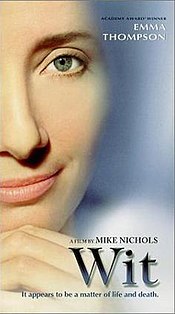
website: https://www.youtube.com/watch?v=NPoGXqNV_wc
valediction
A valediction (derivation from Latin vale dicere, "to say farewell"), or complimentary close in American English, is an expression used to say farewell, especially a word or phrase used to end a letter or message, or the act of saying parting words whether brief or extensive.
The term is also used to refer to the speech given by a valedictorian at a commencement and to refer to final prayers and remarks at the graveside before a burial.
Ode on a Grecian Urn
"Ode on a Grecian Urn" is a poem written by the English Romantic poet John Keats in May 1819 and published anonymously in the January 1820, Number 15, issue of the magazine Annals of the Fine Arts (see 1820 in poetry).
The poem is one of several "Great Odes of 1819", which includes "Ode on Indolence", "Ode on Melancholy", "Ode to a Nightingale", and "Ode to Psyche". Keats found earlier forms of poetry unsatisfactory for his purpose, and the collection represented a new development of the ode form. He was inspired to write the poem after reading two articles by English artist and writer Benjamin Haydon. Keats was aware of other works on classical Greek art, and had first-hand exposure to the Elgin Marbles, all of which reinforced his belief that classical Greek art was idealistic and captured Greek virtues, which forms the basis of the poem.
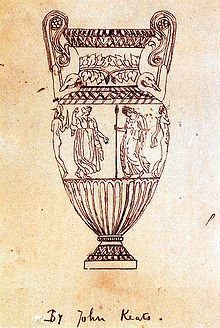
Birches
"Birches" is a poem by American poet Robert Frost. It was collected in Frost's third collection of poetry Mountain Interval that was published in 1916. Consisting of 59 lines, it is one of Robert Frost's most anthologized poems. The poem "Birches", along with other poems that deal with rural landscape and wildlife, shows Frost as a nature poet.
Robert Frost
Robert Lee Frost (March 26, 1874 – January 29, 1963) was an American poet. His work was initially published in England before it was published in America. He is highly regarded for his realistic depictions of rural life and his command of American colloquial speech. His work frequently employed settings from rural life in New England in the early twentieth century, using them to examine complex social and philosophical themes. One of the most popular and critically respected American poets of the twentieth century,Frost was honored frequently during his lifetime, receiving four Pulitzer Prizes for Poetry. He became one of America's rare "public literary figures, almost an artistic institution." He was awarded the Congressional Gold Medal in 1960 for his poetic works. On July 22, 1961, Frost was named poet laureate of Vermont.
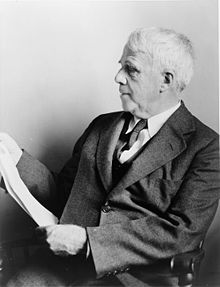
Queer
Queer is an umbrella term for sexual and gender minorities who are not heterosexual or not cisgender. Originally meaning "strange" or "peculiar", queer came to be used pejoratively against those with same-sex desires or relationships in the late 19th century. Beginning in the late 1980s, queer scholars and activists began to reclaim the word to establish community and assert an identity distinct from the gay identity. People who reject traditional gender identities and seek a broader and deliberately ambiguous alternative to the label LGBT may describe themselves as "queer".

Ars Poetica
Ars Poetica, or "The Art of Poetry," is a poem written by Horace c. 19 BC, in which he advises poets on the art of writing poetry and drama. The Ars Poetica has "exercised a great influence in later ages on European literature, notably on French drama" and has inspired poets and authors since it was written.
Horace
Quintus Horatius Flaccus (December 8, 65 BC – November 27, 8 BC), known in the English-speaking world as Horace (/ˈhɒrəs/ or /ˈhɔːrəs/), was the leading Roman lyric poet during the time of Augustus (also known as Octavian). The rhetorician Quintilian regarded his Odes as just about the only Latin lyrics worth reading: "He can be lofty sometimes, yet he is also full of charm and grace, versatile in his figures, and felicitously daring in his choice of words."

Anecdote of the Jar
"Anecdote of the Jar" is a poem from Wallace Stevens's first book of poetry, Harmonium. First published in 1919, it is in the public domain.
This famous, much-anthologized poem succinctly accommodates a remarkable number of different and plausible interpretations, as Jacqueline Brogan observes in a discussion of how she teaches it to her students. It can be approached from a New Critical perspective as a poem about writing poetry and making art generally. From a poststructuralist perspective the poem is concerned with temporal and linguistic disjunction, especially in the convoluted syntax of the last two lines. A feminist perspective reveals a poem concerned with male dominance over a traditionally feminized landscape. A cultural critic might find a sense of industrial imperialism. Brogan concludes: "When the debate gets particularly intense, I introduce Roy Harvey Pearce's discovery of the Dominion canning jars (a picture of which is then passed around)."
I placed a jar in Tennessee,
And round it was, upon a hill.
It made the slovenly wilderness
Surround that hill.
The wilderness rose up to it,
And sprawled around, no longer wild.
The jar was round upon the ground
And tall and of a port in air.
It took dominion everywhere.
The jar was gray and bare.
It did not give of bird or bush,
Like nothing else in Tennessee.
And round it was, upon a hill.
It made the slovenly wilderness
Surround that hill.
The wilderness rose up to it,
And sprawled around, no longer wild.
The jar was round upon the ground
And tall and of a port in air.
It took dominion everywhere.
The jar was gray and bare.
It did not give of bird or bush,
Like nothing else in Tennessee.
Wallace Stevens
Wallace Stevens (October 2, 1879 – August 2, 1955) was an American Modernist poet. He was born in Reading, Pennsylvania, educated at Harvard and then New York Law School, and he spent most of his life working as an executive for an insurance company in Hartford, Connecticut. He won the Pulitzer Prize for Poetry for his Collected Poems in 1955.

Sonnet 73
Sonnet 73, one of the most famous of William Shakespeare's 154 sonnets, focuses upon the theme of old age, with each of the three quatrains encompassing a metaphor. The sonnet is pensive in tone, and although it is written to a young friend (See: Fair Youth), it is wholly introspective until the final couplet, which finally turns to the person who is addressed (the "thou" in line one).
Joseph Kau suggests that Samuel Daniel had a fair amount of influence on this sonnet and that Shakespeare's immediate source of the impresa, or motto, "Qua me alit me extinguit" came from Geoffrey Whitney's A Choice of Emblems (London, 1586)
That time of year thou mayst in me behold
When yellow leaves, or none, or few, do hang Upon those boughs which shake against the cold, Bare ruin’d choirs, where late the sweet birds sang. In me thou see’st the twilight of such day As after sunset fadeth in the west; Which by and by black night doth take away, Death’s second self, that seals up all in rest. In me thou see’st the glowing of such fire, That on the ashes of his youth doth lie, As the death-bed whereon it must expire, Consum’d with that which it was nourish’d by. This thou perceiv’st, which makes thy love more strong, To love that well which thou must leave ere long. |
Because I could not stop for Death
"Because I could not stop for Death" is a lyrical poem by Emily Dickinson first published posthumously in Poems: Series 1 in 1890. The persona of Dickinson's poem meets personified Death. Death is a gentleman caller who takes a leisurely carriage ride with the speaker to her grave. According to Thomas H. Johnson's variorum edition of 1955 the number of this poem is 712.
A Red, Red Rose
"A Red, Red Rose" is a 1794 song in Scots by Robert Burns based on traditional sources. The song is also referred to by the title "Oh, My Love is Like a Red, Red Rose", "My Love is Like a Red, Red Rose" or "Red, Red Rose" and is often published as a poem.
O my Luve's like a red, red rose
That’s newly sprung in june;
O my Luve's like the melodie
That’s sweetly play'd in tune:
As fair art thou, my bonnie lass,
So deep in luve am I:
And I will luve thee still, my dear,
Till a’ the seas gang dry:
Till a’ the seas gang dry, my dear,
And the rocks melt wi’ the sun:
I will luve thee still, my dear,
While the sands o’ life shall run.
And fare thee weel, my only Luve
And fare thee weel, a while!
And I will come again, my Luve,
Tho’ it were ten thousand mile.
That’s newly sprung in june;
O my Luve's like the melodie
That’s sweetly play'd in tune:
As fair art thou, my bonnie lass,
So deep in luve am I:
And I will luve thee still, my dear,
Till a’ the seas gang dry:
Till a’ the seas gang dry, my dear,
And the rocks melt wi’ the sun:
I will luve thee still, my dear,
While the sands o’ life shall run.
And fare thee weel, my only Luve
And fare thee weel, a while!
And I will come again, my Luve,
Tho’ it were ten thousand mile.
沒有留言:
張貼留言